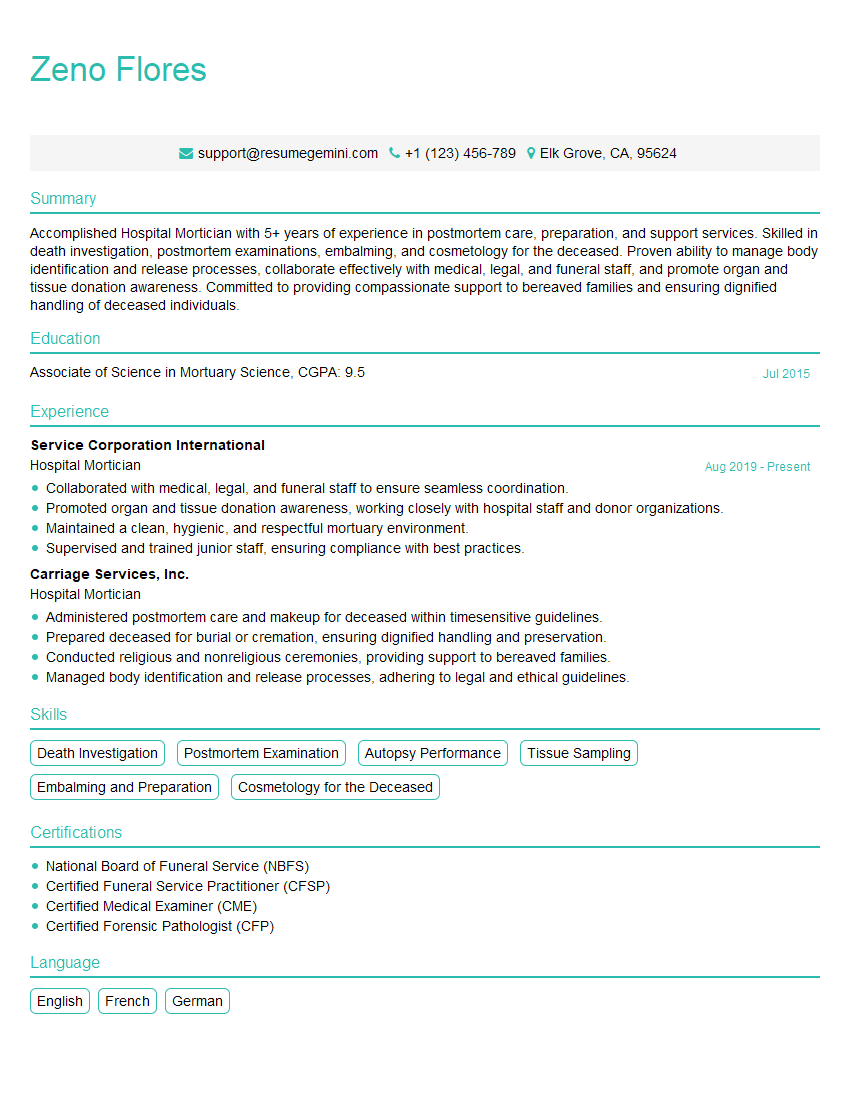Are you a seasoned Hospital Mortician seeking a new career path? Discover our professionally built Hospital Mortician Resume Template. This time-saving tool provides a solid foundation for your job search. Simply click “Edit Resume” to customize it with your unique experiences and achievements. Customize fonts and colors to match your personal style and increase your chances of landing your dream job. Explore more Resume Templates for additional options.

Zeno Flores
Hospital Mortician
Summary
Accomplished Hospital Mortician with 5+ years of experience in postmortem care, preparation, and support services. Skilled in death investigation, postmortem examinations, embalming, and cosmetology for the deceased. Proven ability to manage body identification and release processes, collaborate effectively with medical, legal, and funeral staff, and promote organ and tissue donation awareness. Committed to providing compassionate support to bereaved families and ensuring dignified handling of deceased individuals.
Education
Associate of Science in Mortuary Science
July 2015
Skills
- Death Investigation
- Postmortem Examination
- Autopsy Performance
- Tissue Sampling
- Embalming and Preparation
- Cosmetology for the Deceased
Work Experience
Hospital Mortician
- Collaborated with medical, legal, and funeral staff to ensure seamless coordination.
- Promoted organ and tissue donation awareness, working closely with hospital staff and donor organizations.
- Maintained a clean, hygienic, and respectful mortuary environment.
- Supervised and trained junior staff, ensuring compliance with best practices.
Hospital Mortician
- Administered postmortem care and makeup for deceased within timesensitive guidelines.
- Prepared deceased for burial or cremation, ensuring dignified handling and preservation.
- Conducted religious and nonreligious ceremonies, providing support to bereaved families.
- Managed body identification and release processes, adhering to legal and ethical guidelines.
Certificates
- National Board of Funeral Service (NBFS)
- Certified Funeral Service Practitioner (CFSP)
- Certified Medical Examiner (CME)
- Certified Forensic Pathologist (CFP)
Languages
- English
- French
- German
Career Expert Tips:
- Select the ideal resume template to showcase your professional experience effectively.
- Master the art of resume writing to highlight your unique qualifications and achievements.
- Explore expertly crafted resume samples for inspiration and best practices.
- Build your best resume for free this new year with ResumeGemini. Enjoy exclusive discounts on ATS optimized resume templates.
How To Write Resume For Hospital Mortician
Highlight your compassion and empathy:
Emphasize your ability to provide compassionate support to bereaved families and handle deceased individuals with dignity and respect.Quantify your accomplishments:
Use specific numbers and data to showcase your achievements, such as the number of deceased individuals you have prepared or ceremonies you have conducted.Showcase your technical skills:
Detail your proficiency in postmortem care techniques, embalming, and cosmetology for the deceased, highlighting your ability to perform these tasks with precision and care.Demonstrate your commitment to professionalism:
Emphasize your adherence to ethical and legal guidelines, as well as your commitment to maintaining a clean and respectful mortuary environment.
Essential Experience Highlights for a Strong Hospital Mortician Resume
- Administer postmortem care and makeup for deceased individuals within time-sensitive guidelines, ensuring a respectful and dignified appearance.
- Prepare deceased individuals for burial or cremation, adhering to specific religious or cultural customs and preferences.
- Conduct religious and non-religious ceremonies to provide support and comfort to bereaved families.
- Manage body identification and release processes, following legal and ethical guidelines to ensure proper identification and handling of deceased individuals.
- Collaborate with medical, legal, and funeral staff to facilitate seamless coordination and exchange of information related to deceased individuals.
- Promote organ and tissue donation awareness, working closely with hospital staff and donor organizations to facilitate the process for potential donors.
- Maintain a clean, hygienic, and respectful mortuary environment, ensuring adherence to health and safety standards.
Frequently Asked Questions (FAQ’s) For Hospital Mortician
What are the primary responsibilities of a Hospital Mortician?
Hospital Morticians are responsible for providing postmortem care, preparing deceased individuals for burial or cremation, conducting ceremonies, managing body identification and release processes, collaborating with various professionals, promoting organ and tissue donation awareness, and maintaining a respectful mortuary environment.
What skills are essential for a Hospital Mortician?
Essential skills for a Hospital Mortician include death investigation, postmortem examination, autopsy performance, tissue sampling, embalming and preparation, cosmetology for the deceased, as well as strong communication, interpersonal, and organizational abilities.
What is the educational background required to become a Hospital Mortician?
To become a Hospital Mortician, an Associate of Science in Mortuary Science or a related field is typically required.
What are the career advancement opportunities for a Hospital Mortician?
With experience and additional training, Hospital Morticians can advance to roles such as Funeral Director, Embalmer, or Crematory Operator.
What is the work environment like for a Hospital Mortician?
Hospital Morticians typically work in a hospital or funeral home setting, which may involve exposure to deceased individuals, bodily fluids, and strong odors. They may also work irregular hours, including nights, weekends, and holidays.